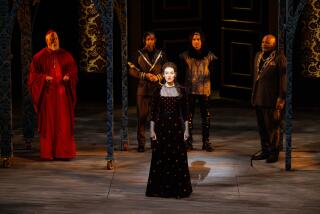‘Henry V’ Loses the Battle but Wins the War
- Share via
SAN DIEGO — Directors staging “Henry V” have a major problem: Shakespeare’s tribute to the English hero-king, mastermind of the incredible military victory over the French at Agincourt, includes no battle scenes.
Consequently, the drama must come largely from the text, which is rich with contention, contradiction, irony and inspiration. Dakin Matthews’ new production, on the Old Globe’s Festival Stage, mines most of those riches but misses on others.
Matthews himself represents an unscripted irony. Last summer, in the same theater, he portrayed John Falstaff in “The Merry Wives of Windsor.” This season, he’s directing the play in which Shakespeare killed off the lovable rogue, one facet of the closure that marks “Henry V.”
It’s the last in the Bard’s tetralogy that saw the wild Prince Hal of the “Henry IV” plays, a carousing compatriot of Falstaff, metamorphosed into a strong, rousing and honorable leader. Accordingly, the reminders of his shady youth are consigned to oblivion.
“Henry V” hews closer to history than most of Shakespeare’s works. That king presided over a newly united nation, thwarted an assassination plot, led the English in a glorious campaign against France and married the French monarch’s daughter in a love match that for a time welded the two regimes. At Agincourt, Henry’s most celebrated triumph, a tired, disease-weakened English army suffered only slight casualties in bloodily defeating a vastly larger, seemingly insuperable French force.
This was accomplished mainly because the overconfident and unorganized French had their armored knights and horses slowed by mud, making them easy targets for the deadly English longbows.
Little of that, however, appears in Shakespeare’s text, so how it’s depicted is strictly up to the director.
Matthews has the battle take place out of view, with only backstage smoke and noise signaling the conflict. The choice is oddly pallid, especially since there’s some onstage combat accompanying Henry’s earlier, less-significant successes in France.
*
Agincourt is finished so quickly and gently that it diminishes the effect of the pre-battle oratory, including the night-before debates between a disguised Henry and his troops and the king’s famous call to arms: “We few, we happy few. . . .”
That speech is one of those handled well by Michael Eric Strickland as Henry. Other times, he isn’t fully facile with Shakespearean cadences or their attendant gestures. The rest of Matthews’ cast, most of whom play multiple--sometimes cross-gender--roles, is solid, notably chorus members Kandis Chappell, Mark Capri and Jonathan McMurtry, and Norman Snow, who keeps the heavy Welsh accent of Fluellen appropriately comic or serious.
Ralph Funicello’s set makes the script’s abrupt switches in location easy to follow. This “wooden O” (in the classic description by the chorus) has a planked floor with a backstage ramp and a small proscenium stage on each side. One is for England, its red curtain festooned with golden lions, the other for France, blue with white fleurs-de-lis.
Lewis Brown’s costumes aptly range from regal to raggedy and generally succeed in avoiding confusion when the same face appears in a new role.
* “Henry V,” Lowell Davies Festival Theatre, Balboa Park, San Diego. Tuesdays through Sundays, 8 p.m. Ends Aug. 12. $23 to $42. (619) 239-2255. Running time: 2 hours, 45 minutes.
More to Read
The biggest entertainment stories
Get our big stories about Hollywood, film, television, music, arts, culture and more right in your inbox as soon as they publish.
You may occasionally receive promotional content from the Los Angeles Times.










